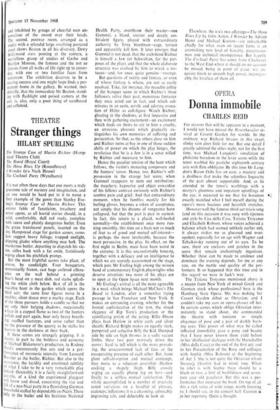Donna immobile
OPERA CHARLES REID
For reasons that will be apparent in a moment,
I would not have missed the Rosenkaralier re- vival at Covent Garden for worlds. In the ordinary way Richard Strauss in this sweet, slinky vein does little for me. But one detail I greatly admired the other night, not for the first time, was Michael Langdon's simulation of philistine boredom in the levee scene while the tenor warbled his pastiche eighteenth century aria with flute obbligato. By this time Mr Lang- don's Baron Ochs has an ease, a mastery and a drollness that make the relentless loquacity of the part almost supportable. And, as he attended to the tenor's warblings with a martyr's glumness and impatient uprollings of the eye, it occurred to me that his boredom 4.1 exactly matched what I feel myself during the opera's more luscious and heartfelt stretches.
However well the famous third-act trio is sung (and on this occasion it was sung with ripeness and style by Lisa della Casa, Tatiana Troyanus and Elizabeth Robson, whose voices achieved a balance which had seemed unlikely earlier on), it always strikes me as glucosed and over- opulent, especially for an age with Wagner and Tchaikovsky running out of its ears. To be sure, there are enclaves and patches in the score that remain enchantingly ingenious. Whether these can be made to coalesce and dominate the evening depends, for me at any rate, on the mettle and quality of the per- formers. It so happened that this time and in this regard we were in luck's way.
The Tatiana Troyanus mentioned above is a mezzo from New York of mixed Greek and German stock whose professional base is the Hamburg State Opera. She was making her Covent Garden debut as Oktavian; and I couldn't take my ears or opera-glasses off her. In certain scenes which oblige Oktavian inter- mittently to stand about, she commanded the theatre with tensions or simple elegances of pose and a pair of darkly burn- ing eyes. This power of what may be called inflected immobility gave a pang and beauty that I have never known them yield before to her 'disillusion' dialogue with the Marschallin (Miss della Casa) at the end of the first act; and to her Presentation of the Rose and colloquy with Sophie (Miss Robson) at the beginning of Act 3. She is not quite the Oktavian whom Strauss :s librettist had in mind, true. When he (she) is with Sophie there should be a blush or two, a hint of bashftilness and seven- teen year old gaucherie. But this was a per- formance that outpaced the book. On top of all 44,, this a rich voice of wide range, worth listening to, I should say, in the concert hall. Carmen is in her repertory. Quite a thought.






































 Previous page
Previous page